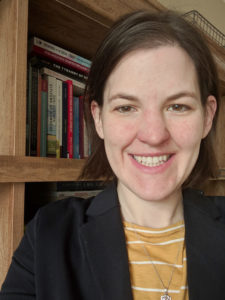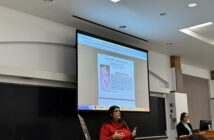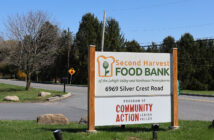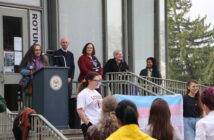
Sarah Stanlick, a professor of practice in the sociology and anthropology department and director of the Center for Community Engagement, is running for the Lower Saucon Township council. Stanlick has also served on the Lower Saucon Valley’s Environmental Advisory Council. (Courtesy of Sarah Stanlick)
Sarah Stanlick, a professor of practice in the Sociology and Anthropology department and the director of the Center for Community Engagement, announced she is running to fill one of the four vacant four-year terms on the Lower Saucon Township council. Stanlick has served for the past five years on the township’s Environmental Advisory Council. The Brown and White asked Stanlick a series of questions about her candidacy and why she’s running.
Stanlick, a Democrat, will first need to win her party’s primary election to advance to November’s general election. The primary will be held on May 21, 2019.
Note: This Q&A has been edited for clarity.
Q: Why are you running?
Sarah Stanlick: A few things. One, I’ve always been a proponent of and care a lot about civic engagement. Clearly through my job, through my work, it’s a current that runs through everything. Second, I’ve been doing a lot of work with the Party Responsibly (capstone) group on campus and with SPAC (Student Political Action Coalition) as well. I started to realize I say a lot of things about getting involved in civic engagement, I care a lot about the town that I am in and I think I would be a good candidate to be able to lead, to be a thoughtful decision maker and to live that civic engagement that I talk so much about in my work.
Q: Why are you running now?
SS: At the end of last year, we had somebody that retired from the council and they did a special request for someone to fill that seat through November of this upcoming year. Thirteen people (including me) came out and submitted their resumes for consideration, they did an interview Senate-style in front of the town council and they selected somebody who was not me, which was fine. It was a really good experience and the amount of things that they asked about and things that I had either thoughtful answers for or I thought I could really do this job, so it was a good confidence boost.
Q: Are you running under a party?
SS: I am a Democrat. It is interesting on a local level, there’s a lot less distinction in a lot of ways between the parties, it’s a lot more issue-focused which I’m finding refreshing.
I believe some of my colleagues from the environmental council are also running. People have things that they care deeply about that might not mirror their national party, and that’s something I’ve learned to appreciate on the environmental council.
Q: Do you have any main issues that are a part of your platform?
SS: Well, things that I care deeply about. I care about a quality education in Lower Saucon. I care a lot about open space and our environmental policies. We have a pipeline that will be built in Lower Saucon, we’re very concerned about that. I know there have been a lot of legal challenges to it, most likely it’s going to go through, so how do you hold people accountable moving forward?
And then getting more young people involved. One of the things I really like about Lower Saucon is that they have a junior council member position, so we have a lot of high school students who are on the council and then on all the associated councils. We have four high school students on the environmental council with us. I feel like that built in civic mentorship is really important, so I want to be part of this.
Q: What separates you from some of the other candidates?
SS: I’ve been really refreshed because I think they are also not of my same party and we’re pretty supportive of one another. But my background, I think being a university professor, seeing some kinds of system-wide issues and exercising systems-thinking. Often times, especially in today’s politics, people are very reactionary — ‘the thing that bothers me is the thing that everybody should be paying attention to.’ I think I bring a really good, level-headed view to things, which I think does distinguish me. I am very good with dialogue, with listening to people, with listening to intent to understand, not just to respond back. I would be a value-add to the council.
Q: What has living in a more politically moderate area done for you?
SS: Growing up in New Jersey, I grew up with folks who graduated from high school and either they became incredibly progressive and advocates in those ways or very conservative…. But then I lived in Massachusetts for a while, and Massachusetts is one of those places that gets a reputation for being incredibly liberal, but they’ve had Republican governors, very strong bipartisanship. I’ve seen some of those examples of what it looks like when it’s done well and how society benefits from that bipartisan cooperation. So being in Lower Saucon, I don’t know, I think most of my neighbors are not of my same political party but we have really productive discussions. I get challenged in ways that I think are healthy.
Q: What made you submit your name last year to fill the council seat originally?
SS: A couple of things. One is I feel like often times those opportunities come about and nobody steps forward, so there’s a vacuum or an absence of leadership. I believe that I will do a good job, and I wanted someone who I believed would be a good candidate to be running for that. The second was just coming off Party Responsibly, and I have to emphasize that was a bipartisan, nonpartisan effort.
Students came out of all stripes, I think there was a really good turnout at Litzenberger House. I was seeing what it meant for young people to get involved like we haven’t seen in recent years. I was a little enthusiastic coming off of that excitement, too. It was a perfect time.
I’ve also done a lot with the environmental council over the past five years, and I’m ready to diversify.
Q: What kind of a record do you have on the environmental council?
SS: I think we’ve been good at creating a thriving, open-space budget. Last election on the ballot was the question of how part of our taxes gets used for open space. I think people really didn’t understand that they already pay those taxes, it was just making a decision about where that money went. I specifically was very involved with trying to educate our local town about what that really meant: a small fraction of a small percentage of the money that we already pay goes to open space preservation.
And others things, like we’d buy land and a couple of open space tracks have been turned into really thriving dog parks or recreational spaces, and that is a huge community asset. So getting people to understand that you’re not paying extra taxes, it’s just about directing money to the things that you really care about and that make the town more livable and thriving.
We’ve done some work on understanding storm water drainage and what that does for our local ecosystems, stuff about composting, native plants work — a lot has been about public education and policy that supports those community assets.
Q: Have you had any preliminary thoughts about what your campaign operation might look like?
SS: Because it’s a fairly small town, my budget will be limited and the infrastructure that I put in will not be exceptionally complicated. Right now I’m testing the waters and just figuring it out. The Northampton County Democratic Committee is really supportive and helpful — they don’t endorse anybody until after the primary. They keep out of it beside being clear about campaign finance rules and the logistics. I don’t think it will be anything more than me and family members. I do have to be really careful because I know as a university professor, I never want students to feel like my politics or running for town council affects their education.
Q: What can you bring to the constituents of Lower Saucon?
SS: I think that I have a pretty strong values barometer, so when I believe in something I’m not someone that’s a pushover. With that said, I’m also open to listening and am someone who can be convinced if there’s a good argument put forth. I think in terms of having a cool head and being able to make good decisions, I’m that as well. I’m also committed. I will show up. Showing up and being committed, I’m often times the first volunteer for things, so I think I really can be depended on in a way that’s positive.
Q: Do you have things that you know you’d want to change or fix if you were elected?
SS: I’m very lucky that I’m in a town that currently is doing really well, is thriving economically, civilly. I do think one of the things we will have to pay attention to is on (Interstate) 378 and in a few other places in Lower Saucon there’s been a lot of business turnover. So one of the things that we will have to focus on is small business development and helping entrepreneurs get started in a couple of different places. I think that’s more a need that we need to face as a town.
Q: Why should a resident vote for you?
SS: I think that I am a committed citizen, I am consistent, I am considerate and compassionate. I have a lot going for me in terms of my research background and my ability to do the work to make a good, informed decision. And I’m a great leader. I really really try to listen to the people that would vote for me and be a faithful representative of those folks.





Comment policy
Comments posted to The Brown and White website are reviewed by a moderator before being approved. Incendiary speech or harassing language, including comments targeted at individuals, may be deemed unacceptable and not published. Spam and other soliciting will also be declined.
The Brown and White also reserves the right to not publish entirely anonymous comments.